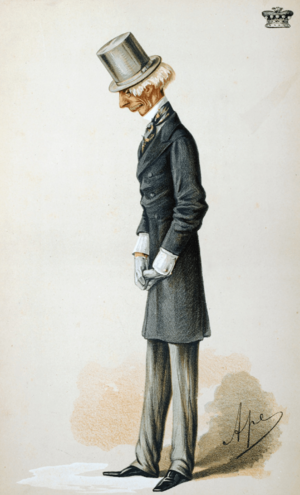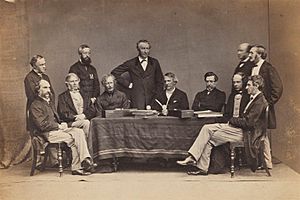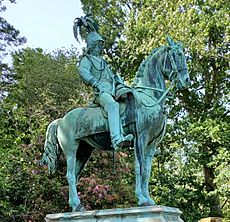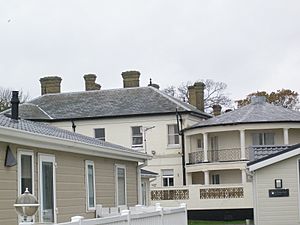Hugh Rose, 1st Baron Strathnairn facts for kids
Quick facts for kids
The Lord Strathnairn
|
|
|---|---|

Lord Strathnairn by Carlo Pellegrini, 1870
|
|
| Born | 6 April 1801 Berlin, Germany |
| Died | 16 October 1885 (aged 84) Paris, France |
| Buried |
Christchurch, Hampshire
|
| Allegiance | |
| Service/ |
|
| Years of service | 1820–1870 |
| Rank | Field Marshal |
| Commands held | Royal Horse Guards Bombay Army India Ireland |
| Battles/wars | Egyptian–Ottoman War Crimean War Indian Rebellion |
| Awards | Knight Grand Cross of the Order of the Bath Knight Grand Cross of the Order of the Star of India |
Field Marshal Hugh Henry Rose, 1st Baron Strathnairn (born April 6, 1801 – died October 16, 1885) was an important officer in the British Army. He was known for his leadership in several major conflicts.
He served as a military advisor to the Ottoman Army during the Egyptian–Ottoman War. Later, he fought alongside the French Army in the Crimean War. His most famous role was during the Indian Rebellion of 1857, where he led the Central Indian Field Force to important victories. After these campaigns, he became a top commander in India and then in Ireland.
Contents
Early Life and Army Start
Hugh Henry Rose was born in Berlin, Germany, on April 6, 1801. His father, Sir George Rose, was a diplomat. Young Hugh was taught by officers from the Prussian Army in Berlin.
He joined the British Army in 1820 as an ensign, which is a junior officer rank. His first assignment was in Ireland, helping to keep order. He later served with different regiments in places like Gibraltar and Malta. While in Malta, he showed great care for his soldiers. He visited every one of them who got sick with cholera, cheering them up. He was promoted to lieutenant-colonel in 1839.
Helping in Syria
In November 1840, Rose was sent to Syria as a British military advisor. His job was to help the Ottoman Army push out the forces of Mehemet Ali. This conflict was known as the Egyptian–Ottoman War.
Rose worked closely with General Omar Pasha, the Ottoman commander. He even served as a senior British officer on Pasha's team. After the war, he became the British consul-general for Syria and Lebanon in 1841. In this role, he worked to stop fights between different groups, like the Maronites and Druzes. He once bravely rode between fighting groups to stop the conflict. He also helped rescue 700 American missionaries from Mount Lebanon, making sure they got safely to Beirut.
In 1851, he became a diplomat in Constantinople (modern-day Istanbul). He played a key role in preventing Russia from gaining too much power over Christians in Turkey.
Fighting in the Crimean War
In October 1853, the Crimean War began. Rose became the British representative at the headquarters of the French Army. He was promoted to brigadier-general in 1854.
During the war, he showed great bravery. He once helped put out a fire that threatened French ammunition supplies, earning him a French award. He fought in major battles like the Battle of Alma in September 1854, where he was wounded. He also fought in the Battle of Inkerman in November 1854 and the Battle of Mamelon in June 1855. He was promoted to major-general in December 1854.
Leading in the Indian Rebellion of 1857

When the Indian Rebellion of 1857 broke out, Rose was given command of the Central Indian Field Force. This force was made up of local soldiers and parts of the army from the Nizam of Hyderabad.
He began his campaign in January 1858. He captured several important places, including Rahatgarh and the fortress at Garhakota. He also defeated rebel forces in the Madanpur pass.
One of his most famous victories was at Jhansi. He arrived there on March 21, 1858, and during the siege, he defeated a large rebel army led by Tatya Tope. Even though his force was much smaller, he won a decisive victory. Jhansi was captured on April 4, 1858. However, the brave Queen of Jhansi, Rani Lakshmibai, managed to escape. Rose continued his campaign, capturing Lahore, Konch, and Kalpi in May 1858.
Later, when the forces of the Maharaja of Gwalior joined the rebellion, Rose quickly returned to command. He captured the city of Gwalior in June 1858, securing another important victory. For his great service, he was promoted to lieutenant-general in 1860. He then became the commander of the Bombay Army and later the Commander-in-Chief, India, the highest military position in India.
Later Life and Honors
In 1865, Rose was given an honorary degree from the University of Oxford. The next year, in July 1865, he became the Commander-in-Chief of British forces in Ireland. In this role, he helped the Irish government deal with the Fenian conspiracy, a movement seeking Irish independence.
For his achievements, he was given the title Baron Strathnairn in July 1866. He retired from his command in Ireland in 1870. He was promoted to the highest military rank, field marshal, on June 2, 1877.
Lord Strathnairn was very fond of horses. At his home in Newsells Park, he had a tall stone monument (an obelisk) built to remember his favorite horse. This horse had carried him bravely during the Indian Rebellion of 1857.

Hugh Henry Rose died in Paris on October 16, 1885, at the age of 84. He was buried in the churchyard of Priory Church in Hampshire, England. A bronze statue of him on horseback was originally placed in London. It was later moved and is now located at Griggs Green in Hampshire. There is also a memorial to him in St Paul's Cathedral.
Family
Hugh Henry Rose was the brother of Sir William Rose and the Countess of Morton. He never married and did not have any children.
Honors and Awards
Rose received many awards for his military service, including:
- Knight Grand Cross of the Order of the Bath (GCB)
- Knight Grand Cross of the Order of the Star of India (GCSI)
- Prussian Order of Saint John of Jerusalem (from Prussia)
- Legion of Honour, 3rd Class (from France)
- Order of the Medjidie, 3rd Class (from the Ottoman Empire)
Military Offices
| Military offices | ||
|---|---|---|
| Preceded by Sir Henry Somerset |
C-in-C, Bombay Army 1860 |
Succeeded by Sir William Mansfield |
| Preceded by The Lord Clyde |
Commander-in-Chief, India 1861–1865 |
Succeeded by The Lord Sandhurst |
| Preceded by Sir George Brown |
Commander-in-Chief, Ireland 1865–1870 |
Succeeded by The Lord Sandhurst |
| Preceded by The Viscount Gough |
Colonel of the Royal Horse Guards 1869–1885 |
Succeeded by Sir Patrick Grant |
| Preceded by Sir John MacDonald |
Colonel of the 92nd (Gordon Highlanders) Regiment of Foot 1866–1869 |
Succeeded by John Campbell |
| Preceded by Sir Thomas Brabazon Aylmer |
Colonel of the 45th (the Nottinghamshire) Regiment of Foot 1858–1866 |
Succeeded by Thomas Armstrong Drought |
| Peerage of the United Kingdom | ||
| New creation | Baron Strathnairn 1866–1885 |
Extinct |
 | Dorothy Vaughan |
 | Charles Henry Turner |
 | Hildrus Poindexter |
 | Henry Cecil McBay |


